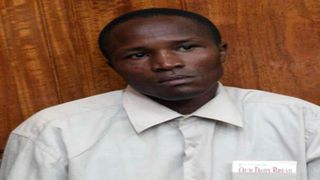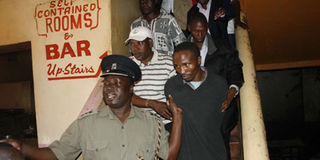
Self-confessed serial killer Philip Onyancha.
| File | Paul Waweru | Nation Media GroupNews
Premium
How shoddy investigation led to acquittal of self-confessed serial killer Philip Onyancha
The High Court on Thursday acquitted murder suspect Philip Onyancha over insufficient evidence, even as the judge called out the prosecution for presenting insufficient evidence in the case.
Mr Onyancha was facing trial over the murder of Jackline Misoi. He was accused of killing her on May 30, 2008 at her flat in Mount Kenya Building along Kombo Munyiri Road, Nairobi.
His arrest and trial attracted public attention following reports that he had confessed to killing and drinking the blood of his victims, most of them women.

Philip Onyancha (in dark sweater) leads police officers to a bar and lodging in Thika Town where he is believed to have killed a victim on June 9, 2010.
Police and prosecution witnesses told court that Mr Onyancha killed Ms Misoi and hanged her body in her bathroom using a scarf tied to the shower.
But in her ruling on Thursday, Justice Jessie Lesiit said the prosecution did not produce enough evidence to find the suspect guilty of the crime.
Poor investigation
The judge said investigations into the murder were wanting and had "disheartening omissions".
For instance, the police failed to investigate whether a mobile phone line that Ms Misoi used to call her father on the fateful day was connected to Mr Onyancha.
"The police did not investigate this line to find out whether it had any connection with the accused. That investigation was critical given the evidence of Police Inspector MacDonald Okoth, that the accused was arrested with a phone and SIM card of a line that was demanding ransom for a missing child. This line that was found from the accused was not even disclosed to the court. That was poor exercise of investigative powers," said Justice Lesiit.
She said the worst of the 'disheartening omissions' in the case was the failure to investigate a stain on the victim’s door, captured by the crime scene officer in his photo of the scene produced as exhibit in court.
"Why would the police not follow this line of investigation, especially because it was the key to unravelling with certainty whether the deceased committed suicide or not?" the judge wondered.
"If it was found to be the blood from the deceased, due to its location, the obvious conclusion would be that it was a third party who stained the door after causing injury to the deceased from which she bled," she added.

Self-confessed serial killer Philip Onyancha.
In the house, police officers found a note on the wall which stated: "I had debt but I cleared some by selling all my things. Bye, sorry this is the end for me. Mob frustration. At least I am now resting in peace. Sorry, bye was tough for me. But anyway I had a last moment for me don’t blame anybody. It was my own. I enjoyed myself with a friend before I decided on my own to end my life. Forgive me Daddy, Carol, Denno and Mark.”
The scene of crime officer, Corporal Johana Tanui, testified that he visited the scene on June 2, 2008. The door to the house had been broken into. He stated that he saw blood stains on the inner side of the main door of the house and that the bed was not spread.
There were blood stains on the floor, between her legs and on her nose. She was wearing a trouser and a pullover. The officer testified that a foul smell emanated from the body which meant that it had been there for a while. He took nine photographs at the scene which he produced in court as evidence.
"The evidence adduced fell far below the required standard of proof beyond any reasonable doubt. I am convinced that Jackline may have been murdered. However, there is no evidence that unerringly points to the accused as the author of her death," ruled the judge.
Dr Minda Okemwa, who performed a post-mortem on the body, had concluded that the cause of death was asphyxia due to neck compression by a ligature. He said he was unable to tell whether it was suicide or murder. The pathologist explained that he did not notice any bite marks on Jackline's neck or anywhere else, and that he could not tell if any sucking of blood had occurred as Mr Onyancha had previously claimed.
In his defence, Mr Onyancha testified that Ms Misoi was not known to him. He stated that he was born in Kericho and lived in Kapkwen Tea Estate where his father used to work. He stated that the deceased’s family lived in Tagabi Estate and that he had never been to that area.
Why confession was rejected
He claimed that upon arrest he was taken to the Director of Criminal Investigations Headquarters in Nairobi, where he was asked to give a video confession, and repeat what he had told the media.
He testified that police wished to produce the taped confessions in court, as well as typed transcripts of the same.
But the evidence was rejected after the court found that the video confession and transcripts were inadmissible since The Evidence (Out of Court Confessions) Rules, 2009 were not adhered to by police officer Benjamin Mwaliko, now retired, who was Senior Superintendent of Police at the time.
The court found that Mr Onyancha's rights had been infringed upon by the police when recording the confession.
More specifically, the court ruled that by handcuffing Mr Onyancha when taking the confession statement, the police violated the provisions of Rule 4(1)(c) of the law which prohibits an arrested person from being subjected to any form of threat, coercion, degrading or inhumane treatment.
Handcuffing him during the process was a glaring reminder that he was not free, the court said.
Secondly, Mr Onyancha had chosen to have his brother present as he gave his confession statement. However, the recording police officer, Superintendent Mwaliko, overlooked this and did not give him a chance to communicate with his brother. He instead delegated that role to another officer who reported that his brother was not available.
Shunned by lawyers
Justice Lesiit noted that many lawyers had refused to represent Mr Onyancha in the trial, and thanked Ms Mary Chepseba for agreeing to defend him.
"It took this court several weeks to get counsel to represent him. Many turned down the request including in open court in the presence of the accused and other parties. Ms Chepseba did not disappoint, and she represented her client with vigour throughout the trial," said the judge.

Self-confessed serial killer Philip Onyancha leaves the Milimani Law Courts, Nairobi on July 8, 2021.
Onyancha still has two other pending murder cases in court.




